More actions
No edit summary |
No edit summary |
||
| Line 5: | Line 5: | ||
==Mechanics== | ==Mechanics== | ||
Ships accelerate by using their engines, almost always located at the stern of the ship. They cannot travel at near-lightspeeds without the use of warp drives. Initiating warp requires an object with mass or feigned mass. The ship will acquire this object as a target and a use warp drive in conjunction with sub-lightspeed thrusters to accelerate through a warp tunnel.[[File:cyno.jpg|200px|thumb|right|"Military experts are calling this a cynosural field." -Journalist during the start of the Gallente-Caldari War in YC110]] | Ships accelerate by using their engines, almost always located at the stern of the ship. They cannot travel at near-lightspeeds without the use of warp drives. Initiating warp requires an object with mass or feigned mass. The ship will acquire this object as a target and a use warp drive in conjunction with sub-lightspeed thrusters to accelerate through a warp tunnel.[[File:cyno.jpg|200px|thumb|right|"Military experts are calling this a cynosural field." -Journalist during the start of the Gallente-Caldari War in YC110]] | ||
Ships can be built and stored in stations except for super-capital classes. Gates and wormholes are methods of travel that propel ships over great distances inaccessible through conventional means of travel. Capital class ships can use their built in jump drives to travel these great distances. A [ | Ships can be built and stored in stations except for super-capital classes. Gates and wormholes are methods of travel that propel ships over great distances inaccessible through conventional means of travel. Capital class ships can use their built in jump drives to travel these great distances. A [[Cynosural Field User's Guide]cynosural field] is used to provide a target for the jump capable ships to lock onto. | ||
The hitpoints of a ship come from its shield, armor and structure. Shields are absent from certain NPC vessels, however all capsuleer ships including capsules have all three defensive systems. These hitpoints are used for [[Tanking]] against incoming damage. Nearly all ships have module slots, allowing them to fit modules types such as(but not limited to) guns, repairers, plates, electronic warfare, cloaks, rigs and afterburners. | The hitpoints of a ship come from its shield, armor and structure. Shields are absent from certain NPC vessels, however all capsuleer ships including capsules have all three defensive systems. These hitpoints are used for [[Tanking]] against incoming damage. Nearly all ships have module slots, allowing them to fit modules types such as(but not limited to) guns, repairers, plates, electronic warfare, cloaks, rigs and afterburners. | ||
Revision as of 10:17, 11 March 2014
A ship or spaceship in EVE Online is an entity used to traverse the heavens, battle enemy forces, ferry materials and products, provide logistical services along with many other uses. A ship may be piloted by a capsuleer(players) or non-player characters such as CONCORD, faction militaries, civilian industrialists, outlawed paramilitary and pirate forces.
Mechanics
Ships accelerate by using their engines, almost always located at the stern of the ship. They cannot travel at near-lightspeeds without the use of warp drives. Initiating warp requires an object with mass or feigned mass. The ship will acquire this object as a target and a use warp drive in conjunction with sub-lightspeed thrusters to accelerate through a warp tunnel.
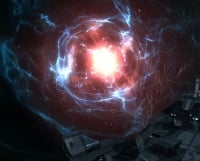
Ships can be built and stored in stations except for super-capital classes. Gates and wormholes are methods of travel that propel ships over great distances inaccessible through conventional means of travel. Capital class ships can use their built in jump drives to travel these great distances. A [[Cynosural Field User's Guide]cynosural field] is used to provide a target for the jump capable ships to lock onto.
The hitpoints of a ship come from its shield, armor and structure. Shields are absent from certain NPC vessels, however all capsuleer ships including capsules have all three defensive systems. These hitpoints are used for Tanking against incoming damage. Nearly all ships have module slots, allowing them to fit modules types such as(but not limited to) guns, repairers, plates, electronic warfare, cloaks, rigs and afterburners.
All ships have capacitor banks, similar to a gigantic battery. The engines charge these batteries and the accumulated energy is used to run modules and power the warp drive.
Certain ships have drone bays, specialized cargoholds, ship maintenance bays and fuel bays.
Spaceship Command
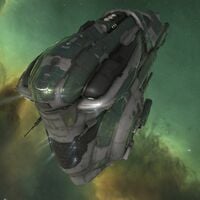
In order to fly ships in EVE, your character must train the Spaceship Command skills required by that ship. This is not the actual Spaceship Command skill itself, but rather the many individual skills under the Spaceship Command category.
The skills for larger hull types and higher tech levels usually require some skill training in smaller hull types or lower tech levels first. In order to fly a T1 cruiser, for instance, you are first required to have some training in a T1 destroyer command skill. Likewise, the command skills for T2 frigates require perfecting the T1 frigate command skills.
In most cases, the prerequisites required to fly bigger ships (by hull type) are faster to train for than the prerequisites required for higher tech levels. As a result, newer pilots may find themselves in large T1 ships (battlecruisers or battleships) long before they can fly a T2 ship of any size. This is not a hard-and-fast rule, though. It's perfectly reasonable to train straight from T1 frigates into T2 frigates, for instance, without ever training the skills required to fly larger T1 ships, if that is your goal as a pilot.
Support Skills
Being able to fly a ship, and being able to fly a ship well, are two very different things. While the command skill may let you get into a ship and undock it from a station, this is only the first step in using a ship properly. In addition to the skills you will need to fit all of the guns and mods you want to use, there is an entire suite of Support Skills you should read about as well.
Fitting
Ships are merely empty hulls just waiting to be equipped with all of the guns and modules that enable them to do a job. The process of equipping a ship is known as "fitting" the ship, and it's an expansive topic. The Fitting Guidelines is an excellent place to start learning about fitting a ship.
However, one basic concept is worth mentioning here as it ties into the ship sizes listed earlier. The ship sizes are grouped into small, medium, large, or xlarge. When browsing the market, you'll notice that modules and weapons are also grouped into these same sizes. When fitting a ship you normally want to use modules and weapons that are in the same size grouping as the ship size. This can sometimes be confusing, especially with weapon systems, as many items may will say "medium" in the name, but actually belong to the "small" size group in the market categories. What matters for ship fitting is that the market category size group matches the ship size, not any terms found in the item name itself.
Categorization
Ships can be categorized in many ways, this section will cover the most basic methods. The examples given are not a complete representation of ships in EVE. It should be noted however, that more expensive or bigger doesn't always mean better in EVE.
Size Class
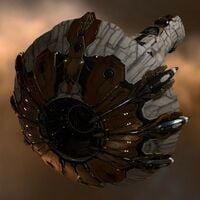
As ships increase in size they gain more hitpoints, theoretical damage and module slots. They sacrifice mobility and damage application against smaller targets. Remember: Bigger isn't always better in EVE. The sizes are as follows;
- Frigates: Incursus, Heron, Crucifier, Burst
- Destroyers: Algos, Corax, Coercer, Thrasher
- Cruisers: Thorax, Caracal, Maller, Scythe
- Battlecruisers: Myrmidon, Blackbird, Harbinger, Hurricane
- Battleships: Megathron, Rokh, Abaddon, Tempest
- Capitals: Rorqual, Anshar, Charon
- Supercapitals
Some ships that don't fit or are hard to pin down in this classification are certain Industrials and ORE Ships. A common simplification of this classification is calling Carriers, Dreadnoughts, Supercarriers, Titans and Rorquals capitals, while calling all other ships sub-capitals.
Tech & Faction Level
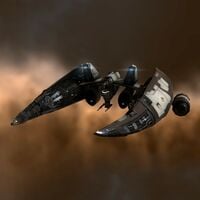
Tech levels refer to the complexity and rarity of the materials required to build a ship. Faction level indicates the origin of the design. Navy faction means the factions with legal navies by CONCORD standards(Gallente, Caldari, Amarr, Minmatar) built the ship. Pirate faction means outlawed entities(Sansha, Serpentis, Guristas etc) have built the ship. The only exception to this are the Sisters of EVE who build pirate faction grade ships but are not outlawed. Here are some examples;
- Tech 1: Incursus, Corax, Omen, Hurricane
- Navy Faction: Brutix Navy Issue, Raven Navy Issue, Imperial Navy Slicer, Republic Fleet Firetail
- Tech 2: Ishtar, Hawk, Paladin, Sleipnir
- Pirate Faction: Vigilant, Gila, Bhaalgorn, Dramiel
- Tech 3: Proteus, Tengu, Legion, Loki
Tech 1 ships are the baseline for all other ships. They are cheap and are built with knowledge available to the galaxy. Navy faction ships are essentially amped up versions of their Tech 1 counterparts, although sometimes their strong features are traded for other advantages. An example is the Drake Navy Issue which trades tanking ability for better damage projection.
Tech 2 ships are built using rarer materials and while their hulls are taken from Tech 1 ships, the way they fly and take advantage of fitting may be very different. They have higher resistance to icnoming damage and are more specialized in their roles as a general rule of thumb. A lot of special modules can only be fit on Tech 2 ships. The Heavy Interdictor is a prime example of a Tech 2 ship filling a specialized role.
Pirate Faction ships are Tech 1 ships that were modified by, unsurprisingly, pirate factions(note: Sisters of EVE is an exception). Over time capsuleers adopted these ships for their superiority over Tech 1 ships. They generally have a bigger tank and better damage application. They may also sport specialized bonuses to certain modules. The Vindicator is praised for it's stasis webifier bonus and massive damage output. Their downside is the price tag because blueprints are scarce.
Tech 3 ships were developed by the four empire factions after reverse engineering Sleeper technology. They are known for their often superior tank and versatility which comes from a special set of modules called subsystems. All materials required for Tech 3 ships come from Wormhole Space. As an example a Legion can be fitted to be a well tanked neuting ship, heavy assault missile boat or the more traditional laser boat. There are many other fits for it depending on what the pilot wants to do.
Industrials
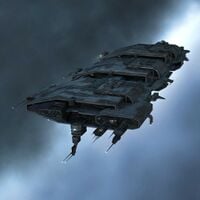
Not all ships are used for aggressive action. Industrialists, logistics officers and miners use a special subset of ships to increase their efficiency for their respective professions. Here is a loose listing of these ships.
- Haulers
- Industrials
- Freighters
- Capital: Rorqual The Rorqual has other primary functions such as ore compression and fleet boosting.
- Miners
- Salvager: Noctis

















